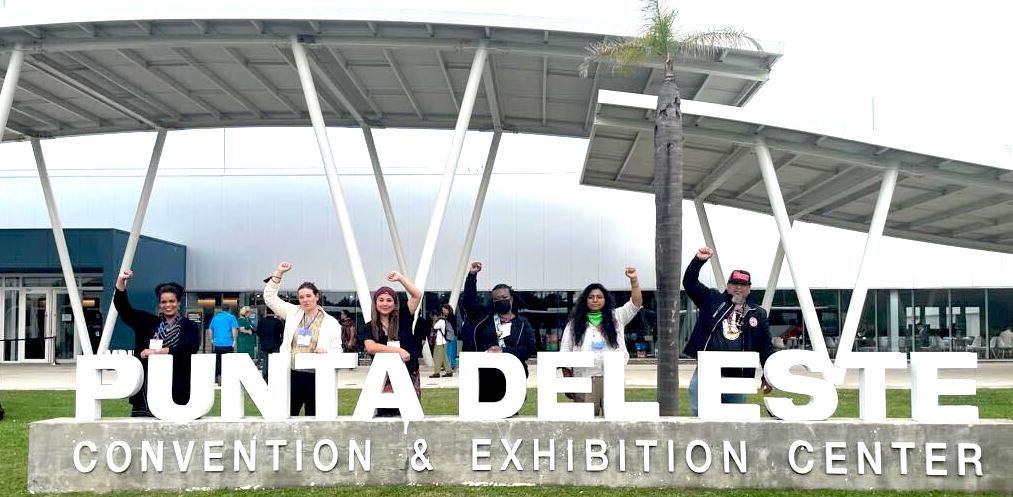For immediate release - December 1, 2022
BFFP US Environmental Justice Delegation Statement on the Global Plastics Treaty INC-1 Negotiations
“We urge the United States delegation to meet with those of us being poisoned, rather than taking another meeting with the industries that are poisoning us."
Punta del Este, Uruguay – In the United States delegation’s opening statement on Monday at the first round of United Nations negotiations for a legally binding global plastics treaty, the U.S. delegation reaffirmed that the "world is drowning in plastics" and that fundamental changes are needed to "end the scourge of plastic pollution." But at no time did they mention the source of that pollution: the fossil fuel and petrochemical industries.
On behalf of the seven environmental justice advocates who traveled from impacted communities across the U.S to participate in these negotiations, we urge the U.S. delegation to acknowledge the sources and impacts of the entire life cycle of plastic pollution on frontline and fenceline communities. In statement after statement, the U.S. has continued to repeat industry talking points and failed to acknowledge the environmental justice crisis fueled by plastic pollution in our home country. Other countries, including several Island Nations, have made more ambitious commitments protecting human health and the environment, and frontline advocates around the world have delivered multiple statements that demonstrate how plastic pollution harms their communities in the same way throughout the entire life cycle of plastics.
Nowhere in the U.S. delegation’s statements have we heard an echo of President Biden's Executive Order that the country "must strengthen our clean air and water protections," "must hold polluters accountable," and "must deliver environmental justice in communities all across America." Neither have we heard anything about the President's directive that all federal agencies must embed environmental justice in their missions and address "the disproportionate health, environmental, and economic impacts that have been borne primarily by communities of color — places too often left behind."
The plastics crisis is a human rights crisis. Last year, UN human rights experts denounced environmental racism in the "Cancer Alley" region of Louisiana – an 85-mile stretch of land along the Mississippi River with more than 150 petrochemical plants and refineries. Since then, UN officials have continued to sound the alarm. Just this week, the UN Human Rights Commissioner said the new treaty must protect human rights and put people before profits.
Despite the fact that more than 99% of plastics are made of fossil fuels, the U.S. delegation is failing to address the range of impacts along the entire life cycle and downplaying the contributions of fossil fuel and petrochemical industries to how the production, use, and disposal of plastics pollute the air we breathe, the water we drink, and the lands we call home.
We cannot reverse the rising tide of plastics until we confront the ongoing petrochemical expansion that is polluting our own backyards in the Gulf South, Appalachia, California, and beyond. The U.S. government has a responsibility to confront the industries that have made sacrifice zones of our communities and hold them responsible for fueling the plastic pollution crisis.
In Houston, Texas, the environmental injustice that the fossil fuel and petrochemical industries have imposed on communities of color is so severe and so pervasive that it can literally be seen from space. If an observer watching from space can see this environmental racism and environmental violence against our communities, why is our own government still not listening to or acknowledging the voices representing these communities here in the negotiating room?
We have repeatedly asked the U.S. delegation for a meeting and have not received a response. It is hard to imagine that requests from industry representatives would be treated the same way.
If the U.S. delegation is not willing to meet with us here, then we would welcome the opportunity to show them our day-to-day experiences when we return.
The global plastics treaty is a once-in-a-lifetime opportunity to address the multi-generational harm that the full life cycle of plastics causes in our communities, including extraction, production, usage, and disposal. The next intergovernmental negotiating committee (INC) is less than six months away.
We urge the United States delegation to look us in the eyes, listen to our words, and speak with us – here or at home – rather than take another meeting with the companies that are poisoning us. Sacrificing us is sacrificing everyone and future generations.
Environmental Justice Advocates:
- Yvette Arellano – Fenceline Watch
- Jo Banner – The Descendants Project
- Juan Mancias – Carrizo Comecrudo Tribe
- Deanna Santiago – Carrizo Comecrudo Tribe
- KT Morelli – Breathe Free Detroit
- Frankie Orona – Society of Native Nations
- Alejandra Warren – Plastic Free Future
Press Contacts:
- United States: Brett Nadrich | brett@breakfreefromplastic.org, +1 (929) 269-4480
- Global: Caro Gonzalez | caro@breakfreefromplastic.org, +1 (646) 991-1013




